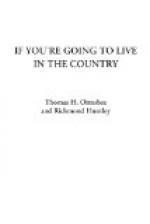Unnoticed at the time, a new sort of pioneering began. City-dwelling people turned hungry eyes toward the cheap country farmhouses located beyond limits of horse and carriage travel. By 1920, this trend was in full swing and greatly expedited by the program of highway improvement and rebuilding that spread across the country.
With a quick and easy means of travel, good roads, telephone and electric service, farmhouses which but a few years before had been as isolated as when Horace Greeley was thundering, “Go West, young man, go West,” were isolated no more. Prices rose but not beyond the purchasing power of those who sought escape from city congestion or the restrictions of fifty-foot suburban lots. The gasoline age had done it. It had married rural peace to rapid transportation. If you had to earn your living in the city, it was no longer required that you and your family live in its midst. A tranquil country home was yours if you would reach for it.
SELECTING THE LOCATION
[Illustration]
CHAPTER II
SELECTING THE LOCATION
It is to be questioned whether any city dwelling family suddenly determines to move to the country. Such changes in one’s way of life are not decided as casually as trading in the old car for a model of the current year. Usually the decision to pioneer backward is reached so gradually that those who take the step can hardly tell in retrospect just when the die was cast. A vacation or summer in the country may have put it in mind. Then a period of vague indecision follows when city and country appear about equally attractive. Suddenly some chance happening turns the scale.
A week-end invitation for cider making in the Hoosatonic Valley in early November would seem harmless enough, but from it dated our own determination to cease to be city dwellers. It must be admitted that the stage-setting was perfect. A twenty-mile ride on the evening of our arrival through the sharp clear air with a full harvest moon hanging high in the heavens, while along the way lights twinkled hospitably from the farmhouses that dotted the countryside. A bright crisp morning and a breakfast of sausages, griddle cakes and syrup. This would have been viewed with lack-luster eye in our overheated city apartment but was somehow just right in this fireplace heated country room with a tang of chill in the far corners.
Later we were to find that plenty of November nights could be raw and stormy; that fireplaces could sulk and give out such grudging heat as to make the room wholly chill. But none of this appeared on that memorable week-end. It waxed warm enough at midday for all of the outdoor pleasures that the country affords. We were in congenial company and evening found us with a sense of peace and well-being that more than balanced the loss of a theatre or dinner party in town. We were guilty of the usual platitudes about “God’s country and the normal way to live” and knew they were that but didn’t care.




